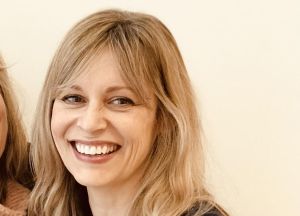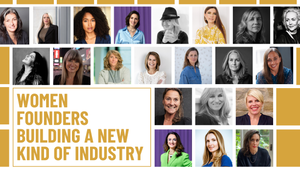
Snapper Films' Joanna Bailey on Stereotypes, Free The Bid and Wandering Round Galleries

Snapper Films director Joanna Bailey started her career making documentaries at the BBC before gaining notoriety with a music video for George Michael set in the red light district of Amsterdam.
Here, Joanna tells us about her recent, powerful campaign for UN Women, where she draws inspiration from, and offers up advice to aspiring female directors.
Q> You’ve recently made a hard-hitting and important film about stereotypes in advertising with UN Women 'Unstereotype Alliance'. Can you tell us how that project came about?
JB> Like most projects to be honest. Agency got in touch, we had a meeting, pitched and then we hunkered down. We had an incredibly short turnaround for a job with such a big cast. The job confirmed and we had to cast and shoot a week and a half later. It was pretty intense but hugely collaborative and rewarding.
Q> Do you feel as a female director, that sometimes you are stereotyped into directing certain projects?
JB> Absolutely. There’s an assumption about the types of spots women can direct and the types of spots men can direct. It’s nonsense. A few years ago, i made a documentary about boxing for Channel 4. I don’t know much about boxing, I don’t particularly like boxing but I’m fascinated by people and want to tell stories. And there were plenty of stories to tell in the white collar boxing world. People and their stories - that’s what interests me. And an ability to tell those stories - it makes no difference what gender you are. I believe strongly in collaboration on a film set, and using the monumental skill set around me. I surround myself with brilliant people - DoPs, editors, production designers and a fantastic production team and I don’t expect to have all the answers. I’m not afraid to lean on people who know better than me when I’m not sure how to do something.
Q> You are part of 'Free The Bid', a non-profit initiative to give women directors a voice in advertising . Do you think it’s important to be part of this movement?
JB> I do. I feel conflicted about it because I don’t want to ever pitch on a job where I’m a token director and not taken seriously. On the other hand if it’s a way of getting women in front of people who wouldn’t normally consider them, it’s worth it.
Q> What piece of advice would you now give your younger self and to aspiring directors in the industry?
JB> Don’t let fear stop you. Don’t let the arrogance of others stop you. Don’t listen to and be discouraged by all the boys who pretend to know everything. They don’t. You have just as much right to be at the top of the call sheet as a man does.
One other thing I’d say to aspiring female directors is (I hope I did and continue to do this) be generous to other women. If you see someone good, encourage, promote and nurture them whenever you can.
Q> What other mediums do you draw inspiration from? (e.g. paintings, photographers, writers, etc).
JB> Photographers definitely. And paintings. I studied Art History at university and love a gallery wander...
Q> And Snapper Films, tell us about how this came about with Helen Hadfield?
JB> I love Hel. She’s a truly special individual. We have a very, very honest relationship which is hugely valuable for me. We are very different as personalities which works and I respect and trust her completely. I hadn’t been happy at Bare for a while but I didn’t want to leave Hel. She didn’t want to be driven by overheads and carrying so many directors anymore so wanted to downsize. We both want to do better work and collaborate with agency and client more as we both feel strongly that it’s the way forward.
Q> What’s next in the pipeline for Joanna Bailey?
JB> A brilliant characterful VW job please?














